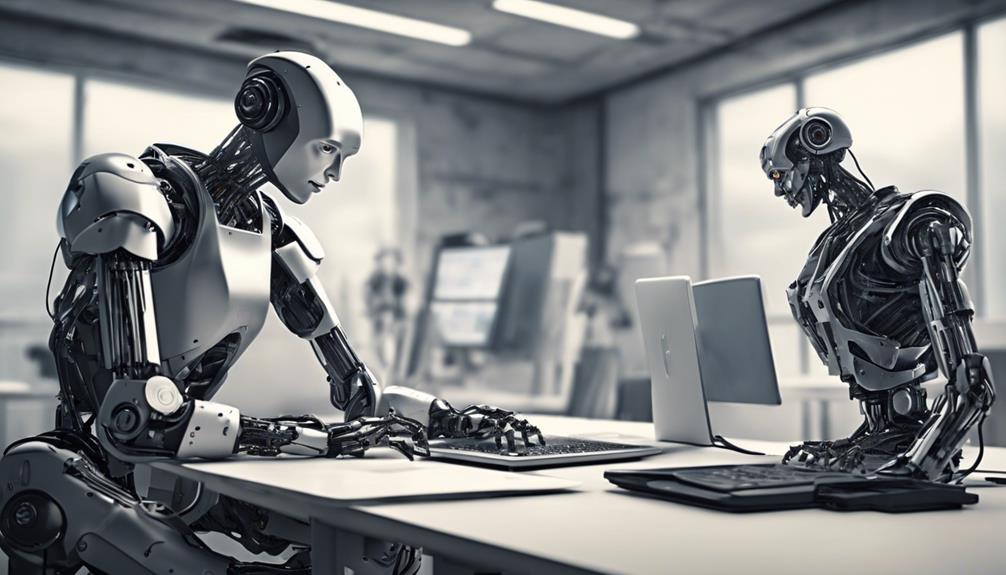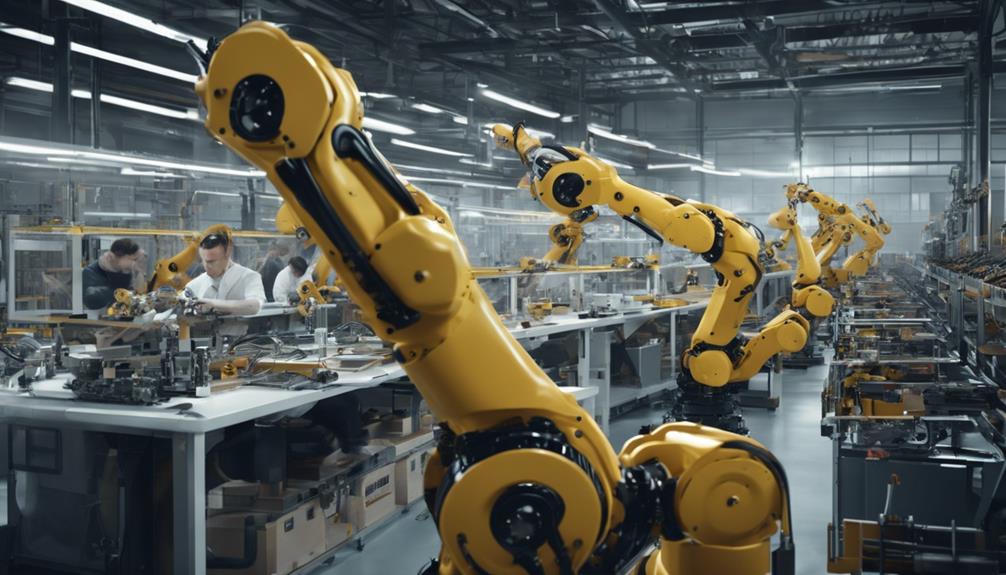With artificial intelligence revolutionizing various industries, many professionals are increasingly concerned about the imminent threat of job displacement.
As AI continues to advance, certain roles are at risk of being automated, raising the need for individuals to proactively strategize to secure their place in the workforce.
Understanding how to navigate this shift is crucial for anyone seeking long-term career stability.
By exploring effective strategies to adapt to this evolving landscape, individuals can position themselves for success amidst the growing presence of AI in the job market.
Key Takeaways
- Acquire skills in non-AI-susceptible sectors for job security.
- Develop human-centered skills like empathy and creativity.
- Blend AI tools with human capabilities for career growth.
- Stay updated on AI advancements and industry trends for adaptation.
Impact of AI on Job Market
The increasing integration of artificial intelligence (AI) in various industries has raised concerns about its profound impact on the job market. Predictions suggest that nearly half of U.S. jobs could be at risk of being replaced by AI within the next 10-20 years. Sectors such as transportation, administrative, production, and service industries are highly susceptible to job replacement by AI. Routine tasks like data entry and assembly line work are particularly vulnerable to AI's efficiency in completing tasks faster, more accurately, and at lower costs than humans, making these jobs at risk of being replaced.
Market research indicates that jobs requiring empathy, creativity, and critical thinking are currently safer from AI replacement due to the human qualities they entail. As AI continues to evolve and develop more advanced tools, workers need to adapt and acquire new skills to remain competitive in the job market. The impact of AI on jobs underscores the necessity for individuals to enhance their skill sets and embrace lifelong learning to navigate the changing landscape of employment.
Strategies for Job Security

Given the imminent threat posed by artificial intelligence (AI) to various job sectors, individuals must proactively strategize to fortify their job security in this evolving landscape. To enhance job security, consider acquiring skills in sectors less susceptible to AI replacement such as healthcare, education, and management.
Staying updated on AI advancements and industry trends is crucial to adapt and remain competitive in the workforce. Specializing in job roles that require complex tasks, human interaction, and creativity can help secure positions against AI automation.
Exploring career growth opportunities in AI-related fields like machine learning engineering and AI ethics specialists can also aid in staying relevant in the job market. Developing a combination of technical skills and soft skills, such as problem-solving and critical thinking, is essential to complement AI tools effectively and ensure long-term job security.
Future-Proofing Your Career
In navigating the rapidly evolving landscape of technology and artificial intelligence, professionals must proactively cultivate a set of adaptable skills to future-proof their careers. To ensure career longevity in the face of AI advancements, consider the following strategies:
- Stay updated on emerging technologies and AI advancements to remain relevant in your field.
- Develop skills in areas that require human interaction and problem-solving, as these are less susceptible to AI replacement.
- Embrace AI tools for improved efficiency and productivity in your current role.
- Consider acquiring diverse skills and engaging in virtual job simulations to adapt to the changing job landscape.
- Blend human skills like empathy and critical thinking with technological advancements to strategize for career growth.
Adapting to AI Disruption

Amidst the rapid evolution of technology, professionals are faced with the imperative task of adapting to the disruptive influence of artificial intelligence (AI) in their respective industries. As AI technologies continue to advance, certain jobs are most likely to be affected, particularly those that handle routine tasks.
To effectively navigate this shift, individuals must focus on honing skills that complement AI capabilities, such as human judgment and critical thinking. Embracing AI tools can help workers streamline their processes, leading to increased efficiency and productivity. Staying updated on AI advancements is crucial to anticipate disruptions in the industry and proactively adapt to changes.
To succeed in the era of AI disruption, it is essential for professionals to seek out resources like online courses and simulations that can enhance their understanding and proficiency with AI technologies. Collaborating with AI systems can also significantly improve job performance and contribute to long-term career growth. By developing the necessary skills and embracing AI tools, individuals can not only adapt to AI-driven changes but also thrive in an increasingly automated work environment.
Navigating AI-Driven Workplace
Navigating the ever-evolving landscape of the AI-driven workplace requires a strategic blend of technological proficiency and human-centered skills. To excel in this dynamic environment, consider the following key strategies:
- Enhance Client Service Skills: Focus on improving customer satisfaction, problem-solving abilities, conflict resolution, and adaptability to stand out in the AI-driven workplace.
- Stay Updated on Technological Advancements: Embrace AI tools for increased efficiency and productivity by staying informed about the latest technological trends and advancements.
- Skill Development Through Virtual Simulations: Utilize virtual simulations to hone your skills, practice real-world scenarios, and enhance your problem-solving abilities.
- Blend Human Interaction with Technological Advancements: Combine the efficiency of AI automation with the irreplaceable human touch to provide unique value and differentiate yourself in the workplace.
- Implement Career Growth Strategies: Invest in continuous learning, seek out opportunities for advancement, and proactively plan for your professional development to ensure long-term success in an AI-influenced work environment.
Frequently Asked Questions
What Kind of Jobs Is AI Replacing?
AI is increasingly displacing roles that involve repetitive tasks across sectors like transportation, administration, production, and services. Jobs susceptible to replacement include data entry, assembly line work, telephone sales, law, finance, and business management.
What Job Will Be Most Affected by Ai?
Professions that rely heavily on repetitive tasks or data processing, such as financial managers, accountants, and market traders, are most affected by AI automation. AI tools efficiently handle routine duties, potentially displacing human workers in these roles.
What Jobs Will Be Gone by 2030?
By 2030, AI is likely to replace jobs in transportation, administration, production, and services due to automation of routine tasks. Sectors at lower risk include management, healthcare, education, and construction, which rely on human interaction and problem-solving skills.
Which Jobs Can Chatgpt Replace?
ChatGPT can replace roles like telephone salespersons, solicitors, psychologists, teachers, and market traders. Its capabilities extend to generating article outlines, summarizing documents, and handling routine tasks efficiently. AI tools like ChatGPT enhance productivity and automate repetitive tasks.
Conclusion
In conclusion, the rapid advancement of AI technology poses a significant threat to various job sectors, with routine tasks being particularly vulnerable to automation. To stay relevant in the evolving job market, individuals must continuously update their skills and embrace AI tools for increased efficiency.
According to a recent study by McKinsey, it is estimated that up to 800 million jobs worldwide could be replaced by automation by 2030. It is imperative for individuals to adapt to this disruption and future-proof their careers.
Ava combines her extensive experience in the press industry with a profound understanding of artificial intelligence to deliver news stories that are not only timely but also deeply informed by the technological undercurrents shaping our world. Her keen eye for the societal impacts of AI innovations enables Press Report to provide nuanced coverage of technology-related developments, highlighting their broader implications for readers.










